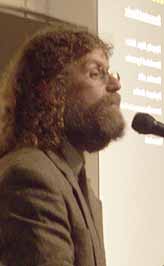| <--previous | next--> |

The interview: part 1
Thom: Do you think there are parallels between human and baboon society? Robert: Definitely. Which is what I keep telling the people who fund my work. We are social primates. We are not baboons. We are quite different from them as far as primates go. But, the common themes are this tremendous combination of competition and cooperation, altruism and sociality. This incredible emphasis on social connectiveness and this ability to generate psychological states out of thin air which baboons are some of the only ones out there which are smart enough to do the same. The big difference being that they need to be comforted by someone grooming them and we can be comforted by a letter from someone on the other side of the planet. They can invent stressors built around: Imagine I'm going to bite you in 2 seconds, and we can invent stressors built around events 20 years in the future. The scales on which we do it are far more dramatic but the underlying primate principles are the same. Thom: How do you convince a university or foundation to fund your research in Africa? This must cost a fortune. Robert: Weirdly enough, compared to my lab work which is tremendously expensive, it doesn't actually cost all that much. It basically is airfare, funds to operate a vehicle and a salary for my Kenyan guides and a couple of sacks or rice and beans and some hormone assays. I spend more money in my lab each year on sterile plasticware for my tissue culture facility than I do in all my fieldwork. Nonetheless, I never have received government funding; it has always been from private foundations. One was a branch of the Guggenheim foundation, which was very interested in the biological origins of violence. My research made sense to them. Recently, a group from the Templeton Foundation, which mostly funds scientific studies of religious belief, has funded me. I am part of a division they have studying the health consequences of forgiveness and cooperation and altruism and such. They are mostly funding things such as if someone with AIDS is able to forgive the person who gave them AIDS; does it improve their immune function, stuff like that. They were very interested in issues such as if you have someone who regularly grooms you, what does that do to blood pressure. It is tapping into folks like that; it would be a hard sell for a federal granting agency. Thom: I actually thought that was a joke when they introduced you as studying the biology or religious belief? Robert: I'm actually quite interested in that. The aspect which fascinates me, and I am an utter, utter card carrying atheist who was once very, very orthodox. I am fascinated by this very solid literature showing that your health is very much better if you are religious and not just because you are less likely to smoke and not just because you get a social community. Religious belief in and of itself seems to be extremely protective of health and that fascinates me. Thom: so does this religious belief protect a person who is going on a suicide mission and will die shortly? Robert: you have predictability. You have your situation improving by dying. You have attribution. If you can understand that there is a god with a rational mind who cares particularly about you and people like you, you have this whole attributional system to explain and predict why an unexplainable world makes sense. Religion absolutely tapes into all the features of psychological stress. Thom: Would you predict that the people in New York city who have strong religious beliefs are having less stress than those who do not? Robert: Absolutely. The studies are clear and atheists have much higher rates of clinical depression, astronomically high rates. It makes perfect sense in many ways. Thom: Years ago when my daughter was just entering high school we moved to Indonesia for the year and suddenly my daughter started to go to an Islamic temple. Do you think this was an attempt to de-stress a stressful situation with a new belief system, which made sense of her new surroundings? Robert: Sure. That would be one form of accessing something, which must have seemed utterly inaccessible, something unpredictable and uncontrollable. Thom: So, you think that when some one converts to a religion when they are either young or old they may be trying to deal with a stress in their lives? Robert: Very much so. There are no atheists in foxholes. That makes perfect sense. Thom: do you have researchers in your lab at Stanford researching the biology of religious belief? Robert: No, that is just one of my pet hobbies. In my lab my research is oriented toward gene therapy and the nervous system which in 5-10 years will either have worked and turned into clinical trials which will be out of my hands or won't have worked and we'll sorta shut down as a field. My guess is that 10 years from now I am going to be working on the neurobiology of those issues, brain imaging, issues of religious belief, impulsivity, faith, stuff like that which is not terrible accessible at this point but will be fairly soon. ... more ... |
|
| <--previous | next--> |

|

|
|
©2002 AIT Press & Thom Gillespie. Pictures by Eriberto Lozada from the Butler University J. James Wood Science Writer Lecture Series |
|